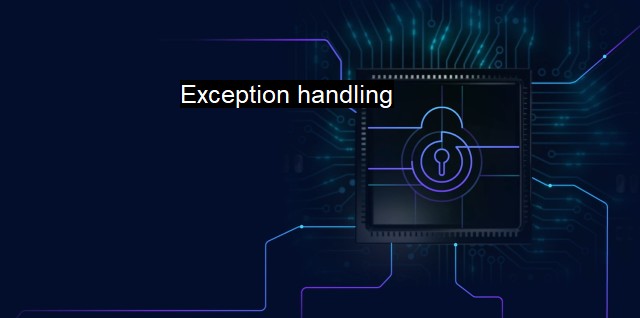What is Exception handling?
Exception Handling: Understanding its Significance in Cybersecurity and Antivirus Software
Exception handling is a crucial aspect in cybersecurity and antivirus applications. It refers to the response given by a computing system or a software program when an exceptional situation or error arises during the execution of the code. Exception handling mechanisms work dedicatedly to manage exceptions so that the normal flow of an application execution would not be severely disrupted.For instance, software programs, like antiviruses, throw an exception when they detect a malicious file. The antivirus program will scan directories and files whenever a user launches a virus scan. If it encounters a file that matches its virus definitions, it will flag this file and throw an exception. This exception generates an alert, which is then displayed on the user's interface to inform them of the potential security risk associated with the named file.
The concept of exception handling is integral to cybersecurity software because it allows for proper identification, management, and containment of potential threats. Exception handling in cybersecurity context aims at ensuring that system vulnerability does not escalate into a disaster, transforming just a possibility of malfunctioning into the ground zero of a significant data breach or cyber attack.
Even more important is the process after an exception has been handled. Here's where remediation starts. In most cases, when a cybersecurity software encounters a potentially harmful file, it brings it to quarantine to isolate the threat from other files. Then, it reports the issue to the administrators for an extensive review and analysis leading to a resolution.
Exception handling's context in antivirus software is not limited to malware detection, however. Think of the antivirus scanning process; it can raise various exceptions besides malware detection, including access permissions, corrupt files, disk space allocation, and more. All these issues must be dealt with wisely to maintain overall system health and performance.
Exception handling, though, is not always perfect, as there could always be unhandled exceptions. Unhandled exceptions, just as it sounds, are exceptions not explicitly handled within the programmed instructions for exception handling. An unhandled exception can cause potential breaches in system security.
Consider a situation where an attacker tries to overflow a stack buffer to cause an exception. Here, if the exception handler is not well prepared to resolve the overflow issue, the originsator of the exception can overtake the handler in a sense, leading to harmful operations onto the system. So, this example highlights why cybersecurity software must handle exceptions correctly and comprehensively.
Exception handlers should be crafted in such a way that expected as well as unpredicted exceptions can be addressed with an aim to minimize the potential risks. Going one step further, predicting the unpredicted use of exception handling can be the key to prevent software crashes, loss of data, or in worst case, security breaches. Therefore, best practices in context of exception handling go hand in hand with proactive cybersecurity measures, forming the front line of defense against potential cyber threats.
Exception handling, with can be regarded as the ability of a program to recognize, handle, and recover from unexpected conditions and errors. Its implementation ensures more robust and secure software. Effective application of exception handling techniques confirms that anomalies in the system are expected, detected, and controlled. This control keeps both the integrity of the system and, importantly, important data residing on the system intact from all upcoming or unanticipated threats.

Exception handling FAQs
What is exception handling in cybersecurity and antivirus software?
Exception handling in cybersecurity and antivirus refers to the process of identifying and resolving errors or exceptions that occur during the execution of the software. It involves creating a mechanism that can gracefully handle errors to prevent system crashes, data loss, or security breaches.Why is exception handling important in cybersecurity and antivirus tools?
Exception handling is critical in cybersecurity and antivirus software because it helps to detect and prevent security threats. It enables the software to handle unexpected events that can allow malware or hackers to exploit vulnerabilities in the system. Effective exception handling can prevent serious security incidents and ensure the software operates optimally.What are some common exceptions that occur in cybersecurity and antivirus software?
Some common exceptions that occur in cybersecurity and antivirus software include input/output errors, network connectivity issues, memory allocation errors, and invalid user input. These exceptions can cause the software to crash, freeze, or exhibit unexpected behavior if not handled properly.How can developers ensure effective exception handling in cybersecurity and antivirus software?
Developers can ensure effective exception handling in cybersecurity and antivirus software by identifying potential errors or exceptions in the code during development, creating a robust mechanism to handle exceptions, and logging errors to provide helpful information for debugging. It is essential to test the software thoroughly to identify any potential exceptions and ensure the exception handling mechanism functions correctly. Additionally, developers should stay up to date with the latest security threats and vulnerabilities to make sure the software can handle new exceptions that may arise.| | A | | | B | | | C | | | D | | | E | | | F | | | G | | | H | | | I | | | J | | | K | | | L | | | M | |
| | N | | | O | | | P | | | Q | | | R | | | S | | | T | | | U | | | V | | | W | | | X | | | Y | | | Z | |
| | 1 | | | 2 | | | 3 | | | 4 | | | 7 | | | 8 | | |||||||